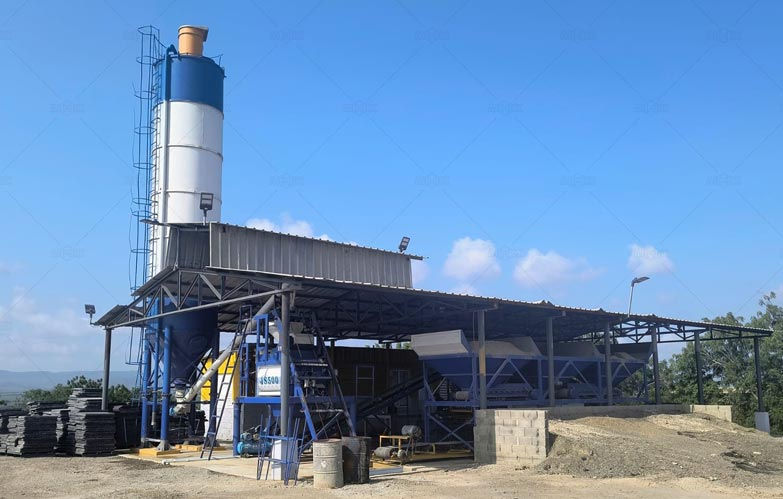Reasons for Investing in a Concrete Plant
- Aimix maquina

- 1 abr 2025
- 4 Min. de lectura
Investing in a concrete plant offers numerous benefits for construction businesses, contractors, and developers. Owning a batching plant enhances project efficiency, reduces reliance on third-party suppliers, and improves cost-effectiveness. With rising demand for high-quality concrete, businesses are increasingly considering different plant options, including stationary and mobile concrete plants. Understanding the advantages can help make an informed investment decision.
Cost Savings and Profitability
1. Reduced Concrete Supply Costs
Producing concrete on-site significantly lowers expenses compared to purchasing from external suppliers. Controlling production helps eliminate price fluctuations, ensuring stable and predictable costs. The concrete plant price(planta dosificadora de concreto precio) may seem high initially, but the long-term savings outweigh the investment. By reducing dependency on external suppliers, businesses can control material costs and manage budgets more effectively.
2. Increased Profit Margins
A concrete plant allows businesses to generate additional revenue by supplying excess concrete to other projects or local contractors. This diversification creates new income streams while improving overall business profitability. Instead of relying solely on project-based earnings, construction firms can expand their services by selling ready-mix concrete to third-party buyers.
3. Lower Transportation and Handling Costs
Eliminating long-distance transportation reduces fuel consumption and logistics costs. A mobile concrete plant further optimizes operations by enabling production closer to the construction site, cutting delivery time and expenses. Additionally, on-site production minimizes concrete wastage due to delays or improper handling, making the process more efficient and cost-effective.

Improved Project Efficiency and Quality Control
1. Consistent Concrete Quality
Having direct control over production ensures that concrete meets required strength and consistency. Adjusting mix proportions on-site enhances quality, reducing the risk of defects and construction delays. This level of control is particularly beneficial for projects with strict compliance requirements and quality standards.
2. On-Demand Production
Owning a concrete plant(planta de concreto Perú) allows businesses to produce concrete whenever needed, preventing project delays caused by supplier shortages or late deliveries. This is especially beneficial for time-sensitive projects such as road construction, bridge repairs, and high-rise building developments where delays can lead to significant financial losses.
3. Customizable Mix Designs
Different construction projects require specific concrete mixes. A batching plant enables businesses to adjust formulations according to project needs, improving structural integrity and overall performance. From high-strength concrete for skyscrapers to lightweight mixes for residential construction, having a plant ensures the ability to meet diverse project requirements.
Adaptability and Operational Flexibility
1. Suitable for Various Project Scales
Whether handling small-scale developments or large infrastructure projects, a concrete plant can be scaled accordingly. Mobile concrete plants(Planta de hormigon movil) are ideal for remote or temporary sites, providing flexibility for diverse applications. Contractors working on projects in different locations benefit from the mobility and efficiency of on-site production.
2. Integration with Advanced Technologies
Modern batching plants feature automation and computerized control systems that enhance accuracy, reduce waste, and optimize production. Smart technology ensures efficiency while minimizing human error. Automated batching systems improve mix consistency, reduce labor costs, and enhance overall plant productivity.
3. Sustainability and Environmental Benefits
Producing concrete on-site reduces emissions associated with transportation. Many plants incorporate recycling systems for water and aggregates, making them environmentally friendly investments. Additionally, modern concrete plants are designed to minimize dust and waste, improving workplace safety and environmental sustainability.
Long-Term Business Growth
1. Competitive Advantage in the Market
Owning a concrete plant gives businesses greater control over project timelines, enabling them to take on more contracts and expand operations. Dependable concrete supply improves reliability and reputation within the industry. Clients prefer contractors who can guarantee timely delivery of materials, leading to increased business opportunities.
2. Reduced Dependency on External Suppliers
Relying on third-party suppliers can lead to project delays due to supply chain disruptions. A dedicated concrete plant minimizes risks, ensuring a consistent workflow and improved project management. Controlling production schedules allows businesses to plan efficiently and avoid unexpected price hikes from suppliers.
3. Higher Return on Investment (ROI)
While the concrete plant price requires upfront capital, the long-term benefits—including cost savings, increased efficiency, and additional revenue streams—result in a strong return on investment. Over time, the reduction in material costs, improved project turnaround times, and increased revenue from selling excess concrete contribute to significant financial gains.
4. Expansion Opportunities
Owning a concrete plant opens doors for future business expansion. Companies can invest in additional equipment, such as truck mixers and cement silos, to scale up operations. Additionally, businesses can expand into new markets by providing custom concrete solutions for specialized industries like road construction, commercial real estate, and infrastructure development.
Conclusion
Investing in a concrete plant is a strategic decision that enhances cost savings, operational efficiency, and business growth. Whether choosing a stationary or mobile concrete plant, businesses benefit from improved quality control, reduced expenses, and increased profitability. By evaluating the concrete plant price against long-term gains, construction firms can make a smart investment that drives future success. With the growing demand for reliable concrete supply, owning a plant positions businesses for long-term success in the competitive construction industry.



Comentarios